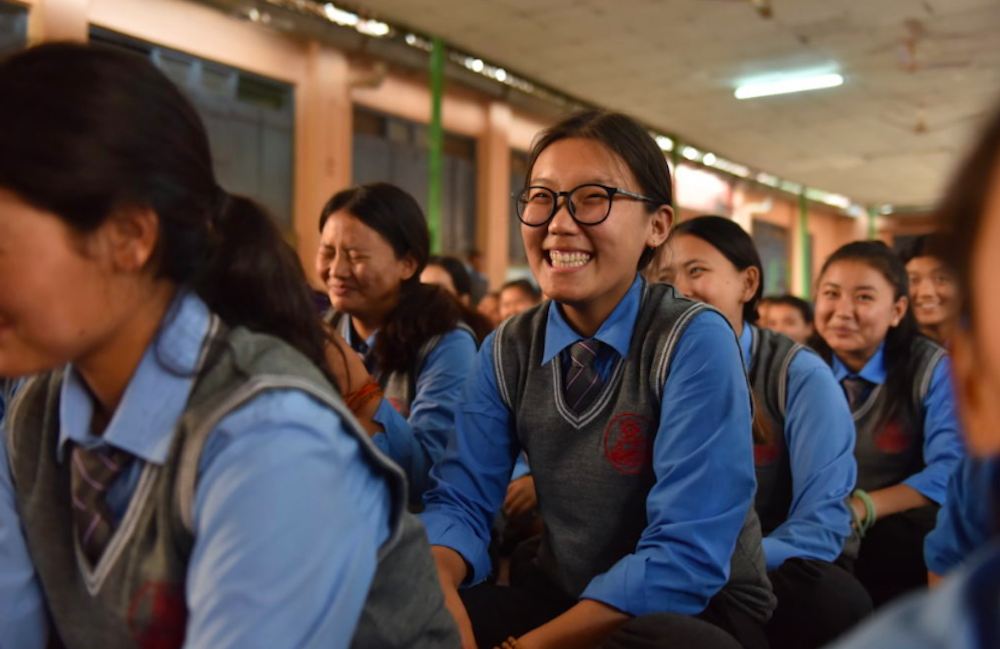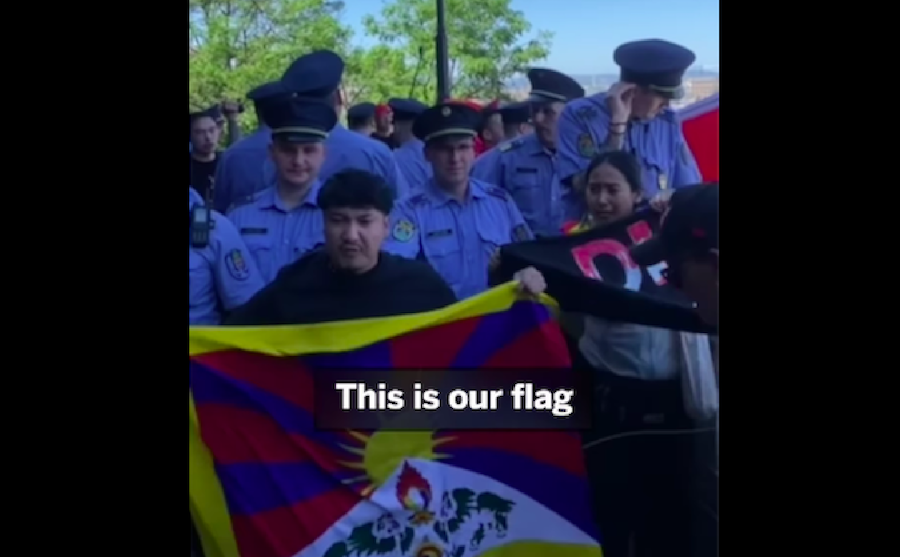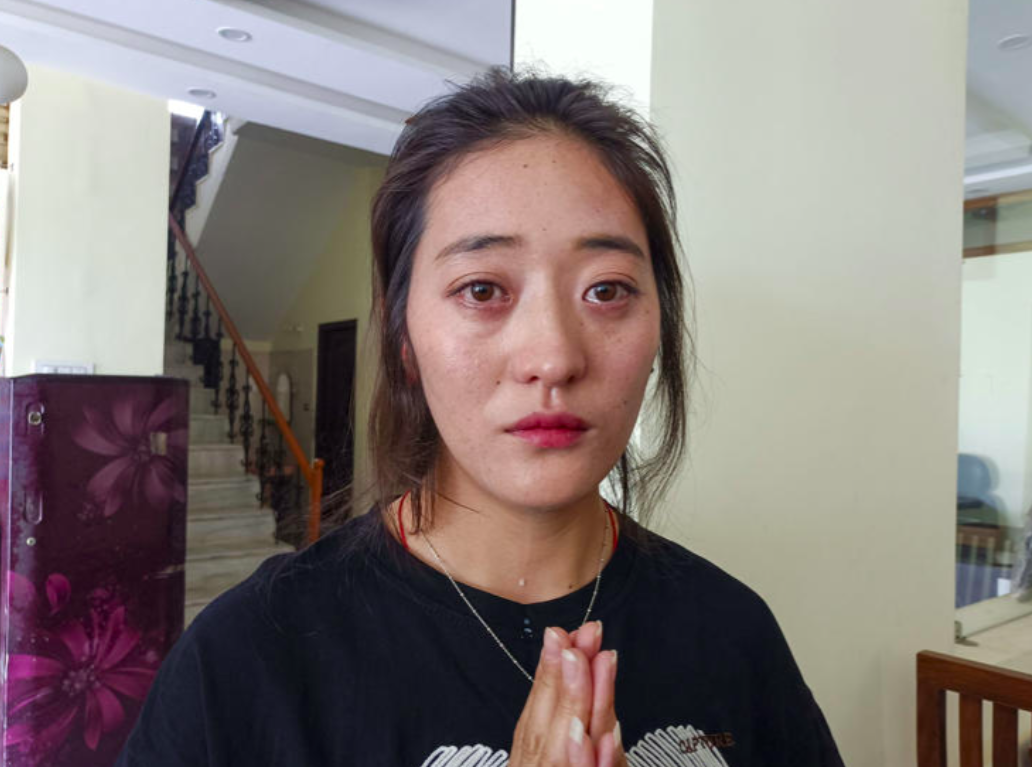 By JOHN IWASAKI
By JOHN IWASAKI
As befits the nephew of the Dalai Lama, Tenzin Choegyal speaks with calmness, thoughtfulness and charity.
But make no mistake: The Edmonds resident, real estate agent and Tibetan Buddhism teacher is a passionate advocate for the liberation of Tibet from China.
Choegyal, 28, was born in Dharamsala, India, the site of the Tibetan government in exile since communist troops marched into Tibet in 1950. His famous uncle, the leading apostle of Buddhism worldwide, has lived in Dharamsala since 1960.
At one time Choegyal wanted to be a monk and studied in his hometown, but then decided to be a journalist so he could write about Tibet. He dropped out of Northwestern University near Chicago after three years and moved to Edmonds in 1997.
In 2000, he returned to Dharamsala for a year to volunteer as a press secretary for the Dalai Lama.
He and his wife, Ngawang Choedon Choegyal, have been married for five years. Their daughter, Tenzin Tsephell, turns 4 next month.
When he is not selling homes for Coldwell Banker Bain, Choegyal teaches Tibetan Buddhism at the Creative Retirement Institute, a program of Edmonds Community College. He is vice president of the Tibetan Association of Washington.
He organized this weekend’s TibetFest at Seattle Center.
What do Americans know about Tibet?
They all know about the Dalai Lama. Nine out of 10 people I meet do. They say, “It’s a beautiful place in the Himalayas.” Yes, but do you know what’s happening to that country? They know about the “Free Tibet” bumper sticker. But do they know, free from what?
Tibet is illegally occupied by China. … Yes, people agree it should be free. (While the United States had oil interests in liberating Kuwait in the first Gulf War), Tibet does not have something to offer. Kuwait was a factor in the heartbeat of America. But Tibet can never be that. No country has the moral courage to pick up Tibet’s issue because they have so much interest in China.
What are people’s reactions when they find out you’re Tibetan?
The reaction ranges from, “Where is Tibet?” to “How’s the situation these days?” The greatest exclamation is when I say I’ve never been to Tibet. I was born in exile. I couldn’t go to Tibet because I had taken part in many political demonstrations.
People take me to be a very spiritual person, not based on my personality, but my ethnic origin. What rubs me the wrong way is that people expect Tibetans to be “peaaaace.” (He pantomimes a prayerful image.) When you take a stand on something, it upsets the image people have.
What’s it like to be related to the Dalai Lama?
I’m just one of his nephews. Growing up, it was a challenge, but very rewarding when someone associated with you is the symbol of integrity and a good human being. It’s up to you whether you can live up to it or not on a daily basis. It’s an added responsibility to live up to his philosophy. When it comes to patience, it’s difficult to live up to him. (Laughs.)
I try to live in accordance with his holiness and philosophy and way of life. It’s great to say you’re the nephew of the Dalai Lama. It’s not like you’re the nephew of Saddam Hussein.
At what point in your life did you realize his significance?
That’s a very interesting question. I found out I was related to his holiness when I was 7 years old. (When the Dalai Lama travels), it’s a great thing to go to the roadside and get a glimpse of him. The family cook said, “How do you feel about your uncle coming to town?” I said, “What?” I went home and asked my mom. “Is it true, his holiness is my uncle?”
After I got married and had a more mature perspective of life, what really dawned on me was how great he was. I had a new responsibility as a husband and as a father. You see things in a different way. In contrasts to life’s struggles, you see how he lives his life and his principles.
Do you have a nephew-uncle relationship with him or is it something different?
When I was small, ’til about 13, he was like an uncle. He’d say, “Tenzin, come here. Have a sweet. Watch TV.” Then, in my teens, it was a trial period. Are you going to be a productive person? He didn’t say it, but that’s the way I took it.
If you have a question now, could you ask him?
I ask through my dad. When I’m (in Dharamsala), I ask for an audience.
What an example of a question you’d ask, and his answer?
As a father, when my wife was pregnant and (we were talking about) naming the child, I wanted his holiness to name the child. And when it came down to deciding what to do in life, I asked him his opinion. I was raising a family. How could I be contributing to the Tibetan cause and to his holiness and to family?
In America, buying a home is a big thing. … Sales people try to make a quick buck. I like to go in there and advise (clients) to the best of their interests. When there’s stress, I try to lessen it. When they’re having a bad day at work, I try to go above the call of duty and try to make the day better for them. Then I feel good. I’m earning my living — and helping them. The fuel for that thought came from his holiness.
What’s the difference between Tibetan Buddhism and Buddhism in other parts of Asia?
The two branches of Buddhism are Mahayana and Hinayana. Hinayana is seeking enlightenment for yourself. Mahayana is seeking enlightenment so you can help others. Hinayana is seeing trouble and building a raft to get away. Mahayana is building a raft so you can take some people. Zen is part of Mahayana. …
There are four traditions in Tibetan Buddhism. They are more historical events than clashes in philosophy. Founders of different ways happened at different historical periods. The practices are the same. The ultimate goal is the same. The teaching is the same.
What differences do you see in the West?
In the West, you find so many dharma (spiritual teaching) centers that do not see the big picture. I find that very distasteful. There has to be a person at the top of the center (who acts if) he is trying to establish a following. Consciously or not, they form a cult. They don’t go to the teachings of Buddha for verification. They go to the lama for verification. That is a folly.
Ever since my time in the United States, I see a lot of dharma centers. But I find it so ironic. They play a very inactive, passive role in the religious freedom, or the pursuit of religious freedom, in Tibet. They are so engrossed in their daily projects. If they raise their voice for dharma in Tibet, I don’t think it’ll hurt their practices.
Some say they don’t get involved in politics. They say, “Seek your own spiritual journey.” But what spiritual journey is bereft of humanity?
Do you try to encourage others to practice Tibetan Buddhism?
I start with a disclaimer: Don’t take it for granted that it’s true. If it works for you, please try it. I just try to show the different perspectives about life, the Buddhist perspective. I do not encourage them to become a Buddhist. To each his own.
You’re the organizer of TibetFest.. What do you want people to know about Tibet, the country and the people?
A country’s ideals, like America’s, are very lofty. We believe in fact that all men are created equal. It’s very easy on the ear; freedom is a birthright. America, as a superpower, should help countries that are oppressed. Why not Tibet? Are we being punished for being non-violent?
If this nation really values peace, peaceful coexistence, then it’s about time they pay attention to the Tibetan cause. It’s not that Tibetans are incapable of taking (up weapons). We’re not above blowing up a bus in Beijing. But we believe strongly that injustice cannot be undone by another unjust act.
If educated people really believe in those things, then studying our cause and doing something about it won’t hurt.
WANT TO GO?
The eighth annual TibetFest will be today and tomorrow from 11 a.m. to 6 p.m. at Seattle Center in the Center House and on the roof of Fisher Pavilion. Grammy Award-nominee Nawang Khechog, who plays traditional Tibetan flute, will perform today at 1:45 p.m. and tomorrow at 11:15 a.m. Free admission. Information: 206-684-7200 or www.tibetaninwashington.com









